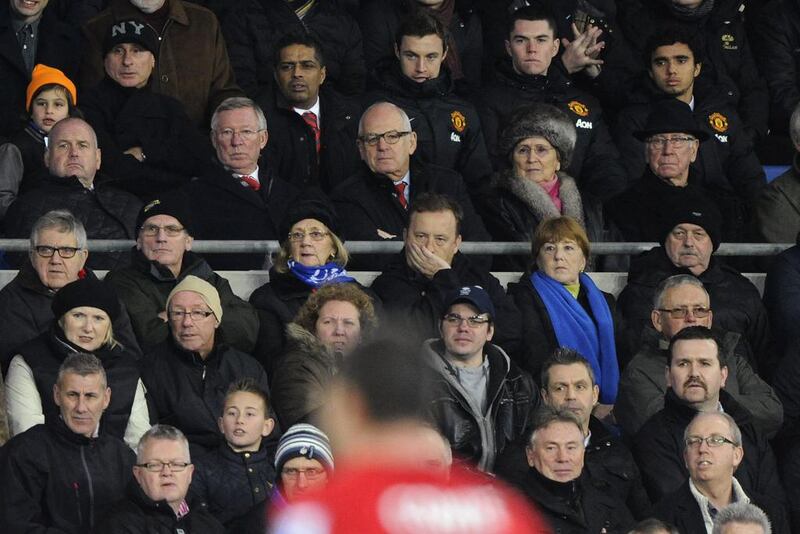Back in May, asked what he would do in retirement, Sir Alex Ferguson imagined a future in which he would travel. He would not, he said, hang around at Old Trafford becoming, as legendary manager Brian Clough put it, the “mother-in-law in the spare room”, preventing the new man from getting on with his life.
At the time, it seemed that he would indulge his fondness for wine and racehorses, play the piano and practise his French. Ferguson, after all, was a rarity among managers in having interests outside football.
Yet it turns out this rich new life has involved an awful lot of watching Manchester United, even midweek away trips to Bayer Leverkusen and Sunderland.
On Tuesday, after United had lost the first leg of their League Cup semi-final away to Sunderland, Bobby Charlton turned to Ferguson in the stand, opened his mouth as though to say something, closed it again, looked down and shook his head sadly.
As an image of the situation at United, it could hardly have been bettered.
That, in a sense, is part of the problem for Ferguson’s successor David Moyes and United.
Television directors can hardly be blamed for cutting to Ferguson every time something goes wrong. It doesn’t really matter what he is doing – glowering at a defensive error, looking on impassively, smiling at a passing acquaintance – it all seems significant.
That means that, whatever the truth of their relationship – and Moyes insists both Ferguson and Charlton are “useful sounding-boards” – the perception will always be of Ferguson somehow sitting in judgment over Moyes. That situation – where speculation on what Ferguson really thinks remains an issue – will erode Moyes’s credibility until or unless results begin to improve.
This is a strange, perhaps intractable, problem. Realistically, what is the alternative? To ban Ferguson, a director of the club, a man who brought unprecedented success in his 26 years as manager, from going to games?
It is not as though he’s doing as Johan Cruyff did as a 34-year-old technical director of Ajax when he came down from the stand during a game against Twente, sat down next to the coach, Leo Beenhakker, and started shouting instructions, transforming a 3-1 deficit into a 5-3 victory.
It is not even as though he is doing what Bill Shankly did after his retirement from Liverpool, still turning up at the training ground in the morning. He is just going to watch games.
Usually when a new manager takes over a club, he can spend the first few months blaming the previous regime.
Tim Sherwood, for instance, after his first game as manager of Tottenham Hotspur, suggested he had inherited a squad from Andre Villas-Boas that was not fit enough to play the sort of football he wanted to play.
Yet Moyes can hardly protest about Ferguson, who is not only the most successful manager in the history of the British game but also won the title by 11 points last season.
That said, and given Moyes was his suggestion as a successor, Ferguson is unlikely to start criticising the former Everton boss any time soon.
The problem is that everybody has started talking about Ferguson watching as being a problem.
Which means one of two things will happen. Either Ferguson keeps going to games and so the issue rumbles on; or he stops going, which would be both desperately sad if that is how he wants to spend his retirement as well as being a bit odd for a director. It might even make Moyes look touchy or weak.
Even if he goes to fewer games there will be controversy over which games he attends and which he doesn’t.
Whether Moyes really feels intimidated by Ferguson’s presence is debatable – after all, he is an experienced Premier League manager. But that is slightly beside the point.
The matter is almost entirely cosmetic, a useful visual image for the wider issue of the successor struggling to emerge from his predecessor’s shadow, which is of interest largely because United are losing.
But it may have some bearing on Moyes’s relations with his squad to the extent that Ferguson’s body language is so often interpreted – rightly or wrongly – as being disapproving.
That adds to a small but growing grumble of discontent, of which the most obvious sign was Rio Ferdinand’s complaint that Moyes reveals the team on the day of the game – something that sounded like one of those flimsy excuses that is seized upon because it offers an easy solution to a much more complicated problem.
Moyes is struggling because he is not Ferguson, because there are limitations to the squad, because the transfer policy of the past few years has been flawed and because certain players are failing to fulfil their responsibilities.
The slump has not been caused by Ferguson’s presence in the stands; rather, the media reaction to his presence is a symptom of that slump.
sports@thenational.ae
Follow us on Twitter @SprtNationalUAE





